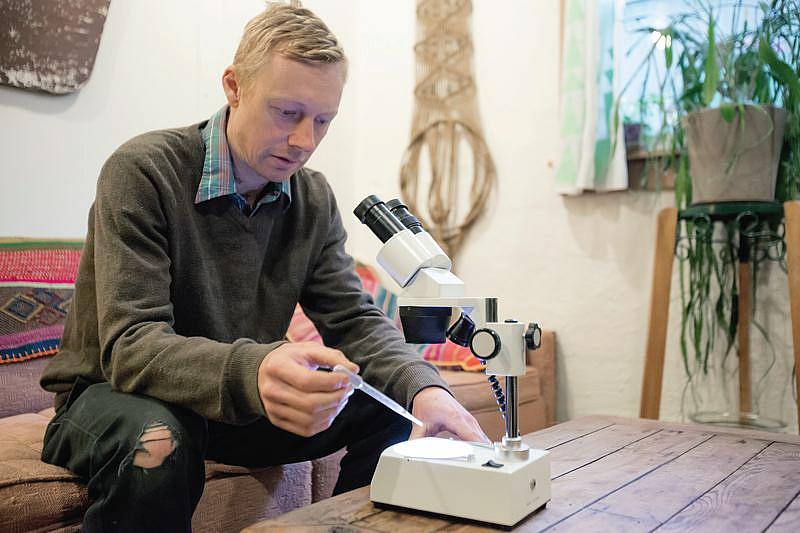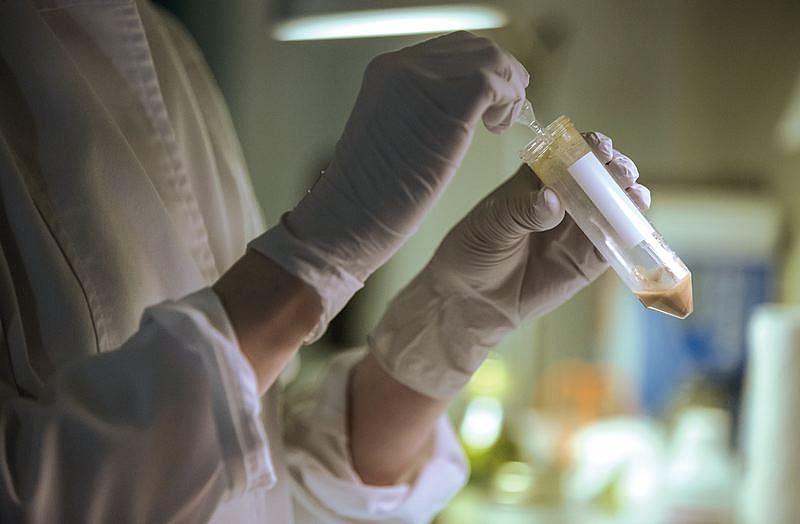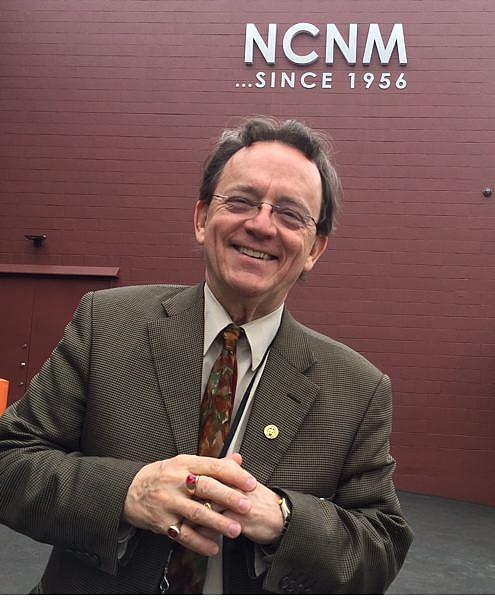Hooked on hookworms (and other parasites)
The Portland Tribune's Peter Korn, a 2009 National Fellow, recently took a look at Oregon residents who've turned to unconventional treatments, and their difficulties in finding doctors who will work them. Korn suggests this is a story that could be easily localized by other reporters in their communities. "The larger story here is how the industry of medicine reacts to patients who want to try out of the box therapies," he recently told the Center for Health Journalism.

Tribune Photo: Jonathan House - Driven by curiosity and suffering from an incurable disease, Scotty Wittlake began researching an alternative therapy his physician refused to discuss. Here, Wittlake uses a dropper to place solution carrying microscopic hookworms onto a slide.
It’s as if Mark Davis just can’t help himself. The Northeast Portland naturopathic physician keeps pushing a little bit harder on the ick factor.
A few years ago, Davis began helping patients perform fecal transplants, a therapy that is pretty much what it sounds like — taking the poop from people with healthy digestive systems and getting it into the guts of people who suffer gastrointestinal diseases such as colitis. At the time, traditional physicians wouldn’t, well, touch it.
Today, fecal transplants are well accepted in mainstream medicine, as is the idea that a healthy gut needs a variety of bacteria and other organisms. Now, Davis is on to a new unconventional therapy called helminths. He’s advising people on how to infect themselves with microscopic worms that will live in their guts and possibly combat a variety of diseases that are the result of malfunctioning immune systems.
You currently won’t find a Portland physician willing to treat patients with hookworms and whipworms, but you might in a few years, say the few U.S. researchers studying the critters. As with fecal therapy, hookworms are being introduced and used in human experiments not at university medical centers, but by patients — people suffering diseases that have traditional medicine stymied — who are willing to try something different.
Some of these unconventional therapies turn out to be bogus and some become internet scams. But sometimes, and increasingly, patients are pushing doctors who are pushing lab scientists on new breakthrough treatments.
That’s what happened with fecal transplants, and it might be happening with hookworms. In the process, it also might be remaking our concept of how medicine is supposed to work.
“We need to embrace the patient who is doing research,” says Dr. Daniel Kalb, a family practice physician in Franklin, Tennessee. Kalb is convinced that helminths represent a breakthrough therapy, and he’s using hookworms to treat patients. Now, he says, medicine has to start accepting some systemic breakthrough of its own.
“We are not the know-alls as physicians dictating what should and should not be done,” Kalb says. “We are there to say someone has an idea — ‘I’ve got cancer, and I want to do IV (intravenous) Vitamin C therapy.’ Your job as a physician is not to say it’s not proven, but to say, ‘Let me look into it, see if it is safe, is there any evidence that shows it may be beneficial, and what are the risks for doing a procedure and what are the risks of not doing another treatment.’”
Worm self-medication
That’s precisely the type of response that Northeast Portland resident Scotty Wittlake was hoping to hear from his rheumatologist recently. Wittlake, active to an extreme, once a professional snowboarder, started feeling pain in his hips and back about 20 years ago, but nothing he couldn’t manage with exercise and stretching. Eventually the pain worsened and walking became difficult.
A local rheumatologist diagnosed a rare autoimmune disease called ankylosing spondylitis, sometimes called bamboo spine. Wittlake’s vertebrae were fusing together. His immune system was malfunctioning and attacking his spine. He was told that once the whole spine was fused, walking would turn into shuffling, and there was no cure.
Drugs to suppress the immune system might slow the onset of the disease, but Wittlake was scared away by the side effects that would result from having his immune system compromised. So he spent a year researching the disease and every therapy anybody had ever considered for it.
Tribune Photo: Jonathan House - Portland naturopathic physician Mark Davis was ahead of most doctors in counseling patients about fecal transplants, and now is intrigued by hookworm therapy.
Which is how Wittlake came across helminths — microscopic worms. Helminths are a tantalizing theoretical solution to a medical trend that has many scientists stymied.
A number of studies have shown that as infectious diseases have been brought under control through better sanitation and elimination of parasites, diseases connected to malfunctioning autoimmune systems have increased. Allergies, for instance. And asthma.
Hookworms are parasites — the very creatures modern medicine has worked to eradicate in order to eliminate diseases such as river blindness. But some hookworms might not be so evil, the new theory goes. In fact, they might be necessary for regulating a healthy immune system by calming inflammatory attack responses.
Hookworms might help rebalance the flora and fauna of his gut and reinvigorate his immune system, Wittlake learned. He was suffering from an immune system disease. But as far as Wittlake could find, nobody had tried using hookworms to treat ankylosing spondylitis.
Nevertheless, in February of last year, Wittlake, 37 and the son of a physician, infected himself with parasites that had been mailed overnight free of charge from a physician in Tennessee. Due to federal Food and Drug Administration regulations, it is illegal to sell helminths within the United States, but Wittlake was able to tap into a growing hookworm underground.
The invisible worm larvae came in a small vial of distilled water. Wittlake used a pipette to put the water on a bandage, which he secured to his forearm. Within minutes his arm started stinging and itching. The worms were burrowing into his bloodstream.
Wittlake says he felt “spacy” that entire day. He wasn’t optimistic when he first tried the therapy but he was desperate for something to halt his steady physical decline. He knew that if he suffered a bad reaction he could take antiparasitic drugs to kill the helminths in his gut. And, he says, he was fascinated by the theoretical basis behind helminths — his own research had turned him into an amateur scientist, driven by scientific curiosity.
“This is the first theory I’ve even heard of that makes total sense to me of why autoimmune diseases even exist,” he says.
By March, Wittlake was feeling worse than usual, if anything. By May he started noticing improvements in his mobility, but still wasn’t convinced it was the hookworms, since his disease, like many autoimmune diseases, had always featured periods of calm followed by relapse. By late last summer he took a course in wilderness emergency response and rode his bike from his Northeast Portland home to St. Johns with little pain.
In July, Wittlake took a second, larger dose of hookworms after incubating the worm’s eggs from his own feces. He bought a microscope so he could count out 30 worms and applied them to his arm.
By fall, Wittlake says, he was walking erect. By December, he was snowboarding pain-free on Mount Bachelor. He took a third dose a month ago. He has shared his worms with two friends suffering from autoimmune diseases. And along the way he’s learned to approach his therapy with a scientist’s caution, even as a part of him wants to tell the world what he’s experienced — even if it might be premature.
“These things aren’t proven, and I have to be aware of that and respect that,” he says. But? “The benefit I’ve gotten is beyond my wildest fantasies. It has literally given me and my wife our lives back.”
But one thing Wittlake doesn’t have back is his rheumatologist. Wittlake wants to keep seeing his physician to monitor his health and progress, but he says he’s been told he can’t. In fact, Wittlake says his physician told him when he started talking about alternative therapies that he’d have to find another doctor if he followed through.
“He refuses to even acknowledge it’s a possibility, and that’s really, really frustrating,” Wittlake says.
Naturopath Davis has been more than willing to see Wittlake. He even provided a prescription for antiparasitic medications just in case.
“That was huge,” Wittlake says. “Someone in the medical field that knew what I was doing, who was supportive and didn’t think I was crazy or dumb for doing it. He was quite the opposite, and he was someone I could call if I got scared.”
Davis says local primary-care physicians who aren’t yet ready to prescribe fecal transplants or helminths routinely refer patients to him who are suffering from gut disorders. He’s sympathetic, and recognizes that medical doctors have malpractice concerns that naturopaths don’t. He also maintains the only stool bank in town for transplants — he screens donors, processes their stool and turns it into capsules.
“They could get in trouble, and they worry about that, so they don’t,” Davis says. “It’s not their expertise. They haven’t been trained on it. ... They are in a system where they can only really recommend FDA-approved therapies without the threat of losing their licenses.”
Tribune Photo: Jonathan House - Fecal material is injected with glycerin at the Good Life Medicine Center in Northeast Portland, readying the material for transplant into a patient .
Davis, on the other hand, has even tried infecting himself with hookworms as a means to learn more. He suffered through a week of the well-documented “worm flu,” with stomach clenching pain and vomiting as the helminths adapted to his body.
While he can’t legally prescribe helminths or sell them to patients, Davis has become convinced they are the next wave of alternative therapy, even as he finds his patients often unwilling to consider them.
“Maybe it’s the ick factor,” he says. “People with celiac and MS come to me and say, ‘I’m interested in fecal transplants.’ And I say, ‘If you really want the best chance of a good outcome, consider helminth therapy.’ A lot of them are at peace with someone else’s poop in their rectum but the idea of worms in their gut still freaks them out.”
A helminth in every house
One of the most high-profile helminth advocates has been William Parker, a Duke University immunologist who believes if parasitic worms are going to enter mainstream therapy, it will be patients and the media leading the charge.
“The public consciousness is what you’re shooting for,” says Parker, who says worldwide there are about 7,000 people introducing helminths into their bodies, but eventually, we all will.
Parker says physicians who refuse to treat patients who opt for helminth therapy are not only uninformed about the science, but making an ethical mistake.
“For patients with no other option, it doesn’t make any sense for a doctor to tell them, ‘No, you can’t do this.’ That’s not part of what medical doctors are supposed to do,” Parker says. “It’s one thing to say, ‘I can’t recommend it.’ It’s another to put pressure on a patient not to try it.”
Parker says there is “good anecdotal evidence” that helminths can help patients with Parkinson’s disease, anxiety, depression and migraines, allergies and a variety of other intestinal and autoimmune diseases.
“Twenty years from now everybody is going to have a helminth, and no insurance company will begin to cover you if you don’t have your helminths,” Parker says. “We’re very confident in the science, that every single human being needs a helminth. It’s part of our biology. There are organisms missing from our environment right now that we need for normal function.”
Dr. Joel Weinstock, chief of gastroenterology at Tufts Medical Center in Boston, isn’t nearly as certain we will all be using helminths, even though he believes they can be effective. Weinstock was part of a team that conducted what is, to date, the only large, double-blind clinical trial on helminths, as a therapy for colitis.
The worms seemed to help patients but the study’s results were inconclusive, Weinstock says, because even those patients in the control group, not receiving helminths, showed improvement — a huge placebo effect.
“Patients who go for this tend to be enthusiastic and enthusiasm causes false positive reports,” Weinstock says.
Weinstock doesn’t think pharmaceutical companies are going to pay for more studies. Today, he is focused on finding the molecules that worms produce and discovering how they help regulate immune systems. Then he can go to pharmaceutical companies with a potential medicine, instead of worms.
“If it became a pill it would have less resistance,” he says. “You’re not swallowing a worm, you’re swallowing a worm molecule.”
Family practitioner Kalb in Tennessee is one of the country’s few medical doctors who are recommending helminths. He’s currently treating six pediatric patients with the worms, for ailments ranging from Crohn’s disease to pediatric autoimmune neuropsychiatric syndrome (PANS), which starts with an infection but can leave children with obsessive-compulsive disorder and tics.
Kalb is convinced helminths’ anti-inflammatory properties can help autistic patients, and he has a practice full of patients who have done their own research, want to try something they’ve discovered online, and have been told by their own doctors that they will need to find a new physician if they want to start experimenting on themselves. That won’t do, in Kalb’s view.
“We need this shift in thinking because we are stuck like hamsters on a treadmill, just going around the same circle,” he says.
Naturopathic college could play role
Duke University immunologist William Parker says helminths will gain the acceptance they deserve once a major clinical trial proves their value for one immune-related disease. Tufts Medical Center gastroenterologist Dr. Joel Weinstock says that trial probably will never be funded.

David Schleich says he knows where such a study could take place — the National College of Natural Medicine in Southwest Portland, where he serves as president.
Naturopaths have been focusing on patients’ gut health for years, Schleich says. They were well ahead of conventional physicians in talking about the dangers of wheat and other immune-related foods, and they’re ahead of most doctors on the subject of what is being called the gut biome, which includes parasitic worms.
In recent years the Helfgott Research Institute at NCNM has begun conducting clinical trials funded by the National Institutes of Health. Most of their studies focus on holistic interventions such as mindfulness-based stress reduction for people with multiple sclerosis and therapeutic mud-pack therapy for knee osteoarthritis.
Conventional medical researchers might have trouble finding patients willing to put hookworms into their bodies as part of an experiment. Not so at the NCNM.
“We have patient populations likely to sign up for a trial on helminths,” Schleich says.
He says because of malpractice laws, naturopathic physicians who wanted to try new therapies always have had more latitude than medical physicians. Now that they have begun documenting their findings, the therapies used by naturopaths are gaining more acceptance among doctors.
In fact, a local nonprofit called the Oregon Collaborative for Integrative Medicine is bringing together representatives of Oregon Health & Science University, NCNM, University of Western States, Pacific University and the Oregon College of Oriental Medicine to encourage a free exchange of ideas among the different health providers.
Schleich says patients pushing their physicians to try new therapies is only going to become more common in the years ahead. Women and midwives, not obstetricians, began advocating for more natural childbirths when C-sections became too common, he says.
Smart patients are now able to do serious research on the internet, and physicians often don’t have the time to keep up on therapies that haven’t yet reached the mainstream, according to Schleich. Even personal devices like Fitbits are providing people with information that in previous generations only their physicians would know.
Major pharmaceutical companies have figured this out, Schleich says, or they wouldn’t be spending so much money on direct-to-consumer drug advertising.
“That innocence of relying on the expert is gone,” Schleich says. “It’s silly. It’s not necessary any longer.”
[This story was originally published by Portland Tribune.]
Photos by Jonathan House/Portland Tribune.